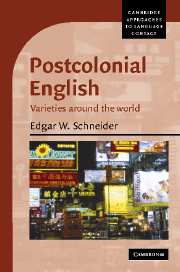Book contents
- Frontmatter
- Contents
- List of maps, figures, and tables
- Series editor's foreword
- Preface and acknowledgments
- List of abbreviations
- 1 Introduction
- 2 Charting the territory: Postcolonial Englishes as a field of linguistic investigation
- 3 The evolution of Postcolonial Englishes: the Dynamic Model
- 4 Linguistic aspects of nativization
- 5 Countries along the cycle: case studies
- 6 The cycle in hindsight: the emergence of American English
- 7 Conclusion
- Notes
- References
- Index of authors
- Index of subjects
7 - Conclusion
Published online by Cambridge University Press: 15 December 2009
- Frontmatter
- Contents
- List of maps, figures, and tables
- Series editor's foreword
- Preface and acknowledgments
- List of abbreviations
- 1 Introduction
- 2 Charting the territory: Postcolonial Englishes as a field of linguistic investigation
- 3 The evolution of Postcolonial Englishes: the Dynamic Model
- 4 Linguistic aspects of nativization
- 5 Countries along the cycle: case studies
- 6 The cycle in hindsight: the emergence of American English
- 7 Conclusion
- Notes
- References
- Index of authors
- Index of subjects
Summary
At the end of this survey, it is time to recapitulate, to focus upon general insights which can be drawn from the above applications of the Dynamic Model to PCEs. It will be helpful to start with a final, brief glimpse at a specific case study where the principles postulated so far are manifested in quite an indicative fashion. LePage and Tabouret-Keller (1985), whose claim that language use constitutes “acts of identity” has obviously been highly influential not only in creole studies but also on the present volume, primarily discuss Caribbean creoles to drive home their message; but they also build an implicit bridge to a similar understanding of PCEs, namely by citing the case of the acculturation of the Chinese communities in Malaysia and Singapore (176–7). The Chinese, they argue, have always looked back culturally to China, but “today pressures are strong for them to adopt in one case a Malaysian, and in the other a Singaporean, identity.” The younger generation is “perhaps faute de mieux … perhaps out of a genuine sense of identity, accepting that they must be Malaysians or Singaporeans first and ‘Chinese’ second, while continuing to want economic advancement.” In both cases this reorientation has resulted in similar sociolinguistic situations, attitudes, and structural effects: code-mixing has grown in importance, and indigenous vernacular norms in English have emerged and become popular.
- Type
- Chapter
- Information
- Postcolonial EnglishVarieties around the World, pp. 309 - 317Publisher: Cambridge University PressPrint publication year: 2007

